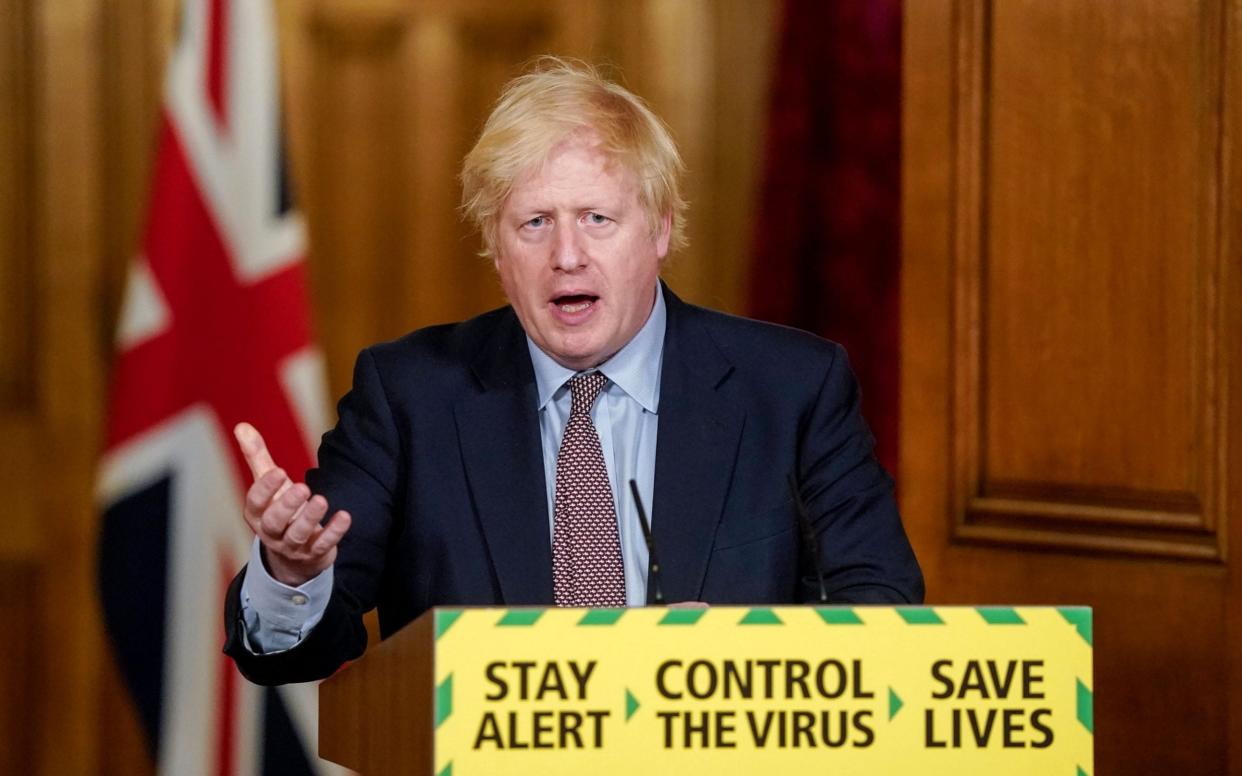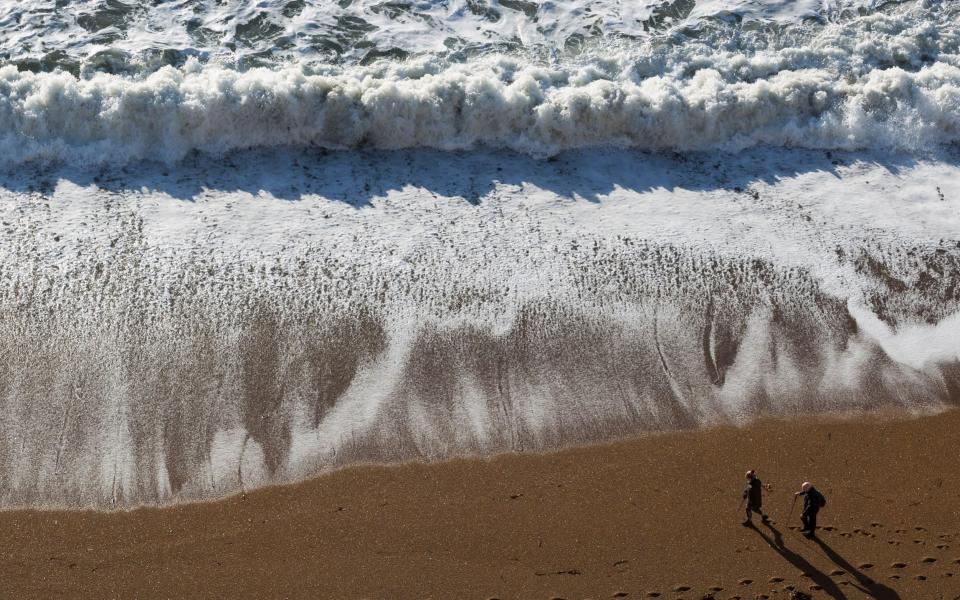Letters: Britain is waiting for a dose of Boris Johnson’s trademark optimism

SIR – Some weeks ago, an optimistic Boris Johnson predicted that Britain would bounce back from the coronavirus pandemic.
But how is this possible in the face of continuing and mounting restrictions? Entrepreneurial Britain cannot function in such a climate.
The Government seems paralysed by its own Project Fear.
Rosemary Davis
Harlow, Essex
SIR – I despair at this Government’s decision-making, with constant U-turns undermining the return to economic normality.
For instance, just when we need to get the tourist and aviation industries going again, it has decided to impose a 14-day quarantine on everyone entering the country.
If the Government continues with its current strategy, the Labour Party will be the beneficiary in four years’ time.
Ian Grice
Northampton
SIR – By all means introduce a quarantine system – but keep it on standby. We need visitors, and we need to travel ourselves.
It would make more sense to demand a health certificate from those entering the country, proving that they have been checked. They should also be required to record their movements.
The Prime Minister and Home Secretary need to be brave and change direction. They will get some brownie points for doing so.
David Germain
Coombe Bissett, Wiltshire
SIR – Perhaps pensioners can help the airlines survive? If my wife and I are allowed to travel abroad, we would be perfectly happy to self-isolate for 14 days upon our return. That’s what we have have for the past 10 weeks.
Peter Wilkie
Tamworth, Staffordshire
SIR – Where is the conclusive evidence that wearing face masks will help to contain the spread of the virus? If there is none, why is it being made mandatory?
I would urge the public to ask this question before accepting yet another draconian measure.
Elvina Parker
Overton, Hampshire
SIR – Now that face masks are essential products, alongside toothpaste and toilet paper, why is it still so hard to find them in shops?
I have read many articles explaining how easy it is to make them. But most of us don’t even darn our socks anymore, and half of us can’t sew loose buttons back on to our shirts. How, if we suddenly find ourselves without a mask, can we be expected to sew one?
Andrew Denny
Willington, Derbyshire
SIR – If I wear a mask on public transport, how do I stop my glasses steaming up?
John Brandon
Tonbridge, Kent
Inflation danger
SIR – I can see that the Chancellor might be tempted to follow Lord O’Neill’s advice to abandon the Bank of England’s inflation target in favour of nominal GDP.
Higher levels of inflation would certainly be useful in inflating away the real value of the very high levels of public-sector debt.
However, for those of us who are dependent on private-sector pensions, higher levels of inflation would inflict permanent damage on our standard of living. Politicians and civil servants should be reminded that the majority of people in this country do not enjoy the security of their gold-plated index-linked pensions, despite being required to pay for them.
John Robin
Lindfield, West Sussex
BBC solipsism
SIR – On Friday afternoon I tuned in to the one o’clock news on Radio 4.
Was the top story coronavirus? Brexit negotiations? Racial unrest in America?
No. The top story was that the BBC had appointed a new director-general. I would estimate that the BBC talks about itself on its news programmes 100 times a year. When is the Government going to get to grips with this self-serving organisation?
Baz Hopkins
Shepperton, Surrey
Japan’s single problem
SIR – I can’t comment on the sex lives of British young people, but when Julie Burchill mocks Japanese men for being “sexually warped” she fails to understand the nation’s real problem.
Both the birth rate and coupling rate is down in Japan, but the major cause of that isn’t pornography or online gaming. It’s economic insecurity.
Nearly half of the Japanese workforce is irregular – they don’t work for companies where they have stable jobs for their whole careers, and instead piece together temporary and part-time jobs with low salaries and no benefits. Only about 20 per cent of irregular workers are able to switch to regular jobs.
In a country where men are still widely expected to be breadwinners and support families, a lack of good jobs is creating a class of men who don’t marry and have children because they – and their potential partners – know they can’t afford to.
Caius Hironaka
London E7
Bishops’ priorities
SIR – Lord Carey’s article struck a chord, in particular his words on how the Church of England’s bishops joined the “storm of hatred” over Dominic Cummings.
Many Christians feel that these bishops are focusing on political correctness and minority interests at the expense of their ministry.
However, it is the apparent lack of support for persecuted Christians worldwide that is most worrying. From the Surabaya attacks in Indonesia to the recent massacre of 52 Christians in Mozambique, we have not heard much public condemnation from the Church. The Archbishop of Canterbury and his army of bishops need to address these issues if they wish to alleviate the concerns of a growing number of Christians.
Michael Nicholson
Arundel, West Sussex
Funeral loans
SIR – During these extraordinary times, people are under great pressure – and none more so than the thousands who are unexpectedly having to pay for the funeral of a loved one.
The funeral plays a crucial role in the grieving process. Families, many of whom have been unable to see their loved one before their death, are doing all they can to organise meaningful funerals – but, for many, the additional financial pressure is overwhelming.
According to the Office for National Statistics, since the first Covid-19 death in March, 169,500 people have died in England and Wales. Nearly 56,000 of these have been excess deaths. Research from Europe Economics, commissioned by the National Association of Funeral Directors, suggests there will be between 33,000 and 85,000 further excess deaths in the event of a second wave.
There are also growing concerns about the casualties of lockdown – the impact of rising unemployment, loneliness and financial hardship. ONS figures show that the areas with the highest death rates are also the poorest, where people are least able to pay for a funeral.
We are therefore calling on the Government to introduce an interest-free crisis funeral loan, covering funerals that have taken place during the lockdown and continuing for as long as restrictions are in place.
This loan should be available to all, without being means-tested. It could be administered through existing mechanisms such as the Bounceback Loan and Child Funeral Fund. Repaid over 12 or 24 months, it would ensure that those who have had the traumatic experience of organising a funeral at short notice do not have the additional stress of financial uncertainty. It is the right thing to do – for the sake of decency and social justice during this unprecedented period.
Carolyn Harris MP (Lab)
Mark Isherwood MS (Con)
Chairman, Cross Party Group for Funerals and Bereavement in the Welsh Parliament
David Collingwood
Director of Funerals, Co-op Funeralcare
Jon Levett
Chief Executive, National Association of Funeral Directors
Mohamed Omer
Board Member, Gardens of Peace Muslim Cemetery
Sir Mark Hendrick MP (Lab)
Jim McMahon MP (Lab)
Matthew Reed
Chief Executive, Marie Curie
Rt Rev Paul Ferguson
Bishop of Whitby
Sam Kershaw
Chief Executive Officer, Funeral Partners
Alison Crake
Senior Partner, Crake and Mallon Funeral Service
Cleaned out
SIR – Lawrence Kirk (Letters, May 31) suggests refitting doors in public spaces with copper handles to prevent the spread of disease.
Unfortunately, they would be nicked before nightfall.
Gordon Brown
Grassington, North Yorkshire
It’s time for some blue-sea thinking on energy

SIR – Edward Clowes is correct that Britain still needs coal-fired power stations in spite of the recent dip in demand. But this need not be the case for much longer.
Wind and solar are established parts of the UK’s energy supply, but we must not stop there. The next step should be tidal (aka lunar) power, which is a tried-and-tested concept but requires Government support for the development of technology to make it cost-effective, as has happened with wind. We should also be looking at waste-to-energy generation, which would tackle the question of what to do with unrecyclable waste, and offer a new use for coal power stations reaching the end of their lives.
However, while investment in these sources is vitally important, Britain also needs to get better at managing demand. Our strong industrial heritage means we have plenty of large energy-intensive plants, some of which are self-powered, like the Liberty Aluminium smelter in Fort William, with its associated hydro-electric facilities. With appropriate grid infrastructure and incentivisation, such facilities can release vast amounts of energy when the grid most needs it.
Ingenious solutions such as these will help complete the puzzle of how to keep Britain’s lights on without destroying the environment.
Jay Hambro
Chief Investment Officer, GFG Alliance
London W1
Resisting the assault on Hong Kong’s freedoms
SIR – Winky So, director-general of the Hong Kong Economic and Trade Office (Letters, May 31), defends the new national security law. I believe she misses the point.
As an elected member of local government, I am free to propose legal policies that may have all sorts of ramifications for people in the area I represent. If they disagree with me (and they often do), they are free to question publicly my policies and my suitability to represent them – and to vote me out at election time if they see fit. What I cannot do is have them arrested, detained and imprisoned for any of the above. Under the authoritarian Chinese security proposals for Hong Kong, however, they would have to accept my policy without dissent – otherwise I might choose to define their criticism as “acts of succession, subversion and terrorism”.
I do not in any way condone the violence and destruction of property, which I believe weakens any cause, but for democracy to thrive there must be opposition. History teaches us that we appease the oppressors at our peril.
Cllr Sven Hocking (Con)
Salisbury, Wiltshire


